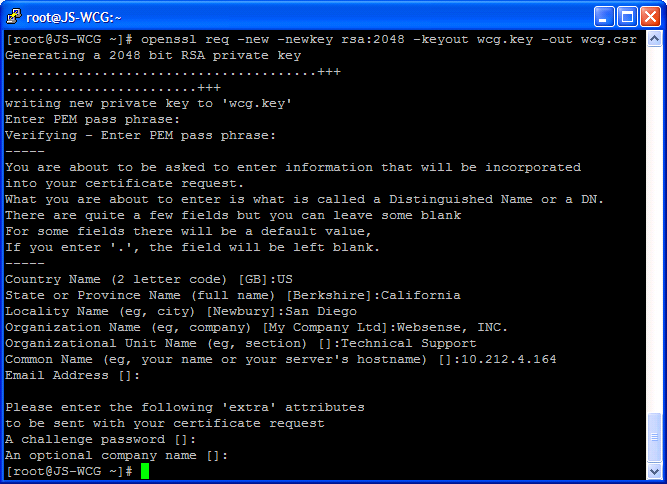Generate Private Key From Csr File Openssl
Set OPENSSLCONF=c: openssl-win32 bin openssl.cfg openssl pkcs12 -in filename.pfx -nocerts -out key.pem openssl rsa -in key.pem -out myserver.key. The private key will be saved as ‘myserver.key’. Carefully protect the private key. Be sure to backup the private key, as there is no means to recover it, should it be lost. Jul 09, 2019 The Private Key is generated with your Certificate Signing Request (CSR). The CSR is submitted to the Certificate Authority right after you activate your Certificate. The Private Key must be kept safe and secret on your server or device, because later you’ll need it for Certificate installation. Generating the Private Key - Linux 1. Open the Terminal. Navigate to the folder with the ListManager directory. Instagram messenger app for a mac. Type the following: openssl genrsa -out rsa.private 1024 4. The private key is generated and saved in a file named 'rsa.private' located in the same folder. Generating the Public Key - Linux 1. Open the Terminal.
OpenSSL CSR Wizard
Openssl Generate Certificate

Our OpenSSL CSR Wizard is the fastest way to create your CSR for Apache (or any platform) using OpenSSL.
Fill in the details, click Generate, then paste your customized OpenSSL CSR command in to your terminal.
Note: After 2015, certificates for internal names will no longer be trusted.
Common Name (Server Name) The fully qualified domain name that clients will use to reach your server. For example, to secure https://www.example.com, your common name must be www.example.com or *.example.com for a wildcard certificate. Although less common, you may also enter the public IP address of your server. Department (optional) You can leave this field blank. This is the department within your organization that you want to appear on the certificate. It will be listed in the certificate's subject as Organizational Unit, or 'OU'. Common examples: Web Administration, Web Security, or Marketing City The city where your organization is legally located. State or Province The state or province where your organization is legally located. Country We guessed your country based on your IP address, but if we guessed wrong, please choose the correct country. If your country does not appear in this list, there is a chance we cannot issue certificates to organizations in your country. Organization name The exact legal name of your organization, (e.g., DigiCert, Inc.) If you do not have a legal registered organization name, you should enter your own full name here. Key RSA Key sizes smaller than 2048 are considered unsecure. Now just copy and paste this command into a terminal session on your server. Your CSR will be written to ###FILE###.csr. |
After you've created a Certificate Signing Request (CSR) and ordered your certificate, you still need to install the SSL certificate on your server.
For instructions on how to install SSL certificates, see SSL Certificate Installation Instructions & Tutorials.
Where do I paste this command?
You can run this command wherever you have OpenSSL available—most likely on your server, but you can also run it on your own computer since macOS comes with OpenSSL installed. Just make sure you keep track of your private key file after you create your CSR; you'll need that private key to install your certificate.
What happens when I run this command?
OpenSSL creates both your private key and your certificate signing request, and saves them to two files: your_common_name.key, and your_common_name.csr. You can then copy the contents of the CSR file and paste it into the CSR text box in our order form.
What kind of certificate should I buy?
If you want an SSL certificate for Apache, your best options are Standard certificates and Wildcard certificates.
A DigiCert Wildcard can protect all server names on your domain (e.g., *.example.com,). Our unlimited server license lets you protect all your servers for just one price. Many of our customers save thousands of dollars per year by using a DigiCert Wildcard certificate.
| Per Year Pricing | ||||
|---|---|---|---|---|
| 2 Years | $653 per year | ($1,307) | (You Save 10%) | |
| 1 Year | $688 | |||
Standard certificates are able to protect one server name (e.g., mail.example.com). If you only need SSL for one hostname, a Standard certificate will work perfectly.
| Per Year Pricing | ||||
|---|---|---|---|---|
| 2 Years | $207 per year | ($414) | (You Save 10%) | |
| 1 Year | $218 | |||
What If I Need Subject Alternative Names?
Multi-Domain (SAN) certificates allow you to assign multiple host names—known as Subject Alternative Names or SANs—in one certificate.
Using OpenSSL to Add Subject Alternative Names to a CSR is a complicated task. Our advice is to skip the hassle, use your most important server name as the Common Name in the CSR, and then specify the other names during the order process. Our Multi-Domain (SAN) certificate ordering process allows you to specify all the names you need without making you include them in the CSR.
Generate Private Key From Csr File Openssl Free
You can also use OpenSSL to create a certificate request for your code signing certificate.
Si desea información en español a Hacer un CSR Utilizando OpenSSL.
Related:
- Learn more about what our Wildcard certificate can do for you.
- We also have a similar CSR Tool for Exchange 2007.